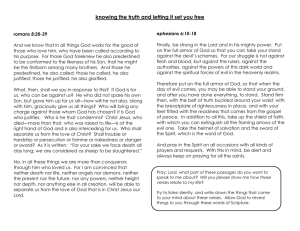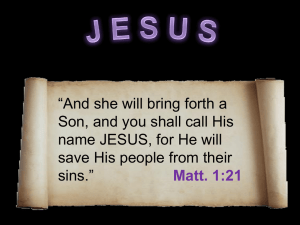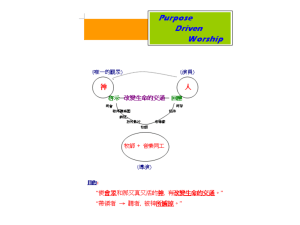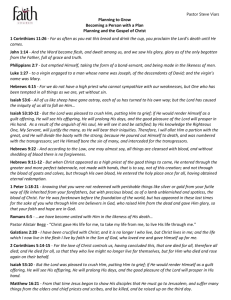Lesson 15 Lord`s Day 13 God the Son and Our Redemption Part 3
advertisement
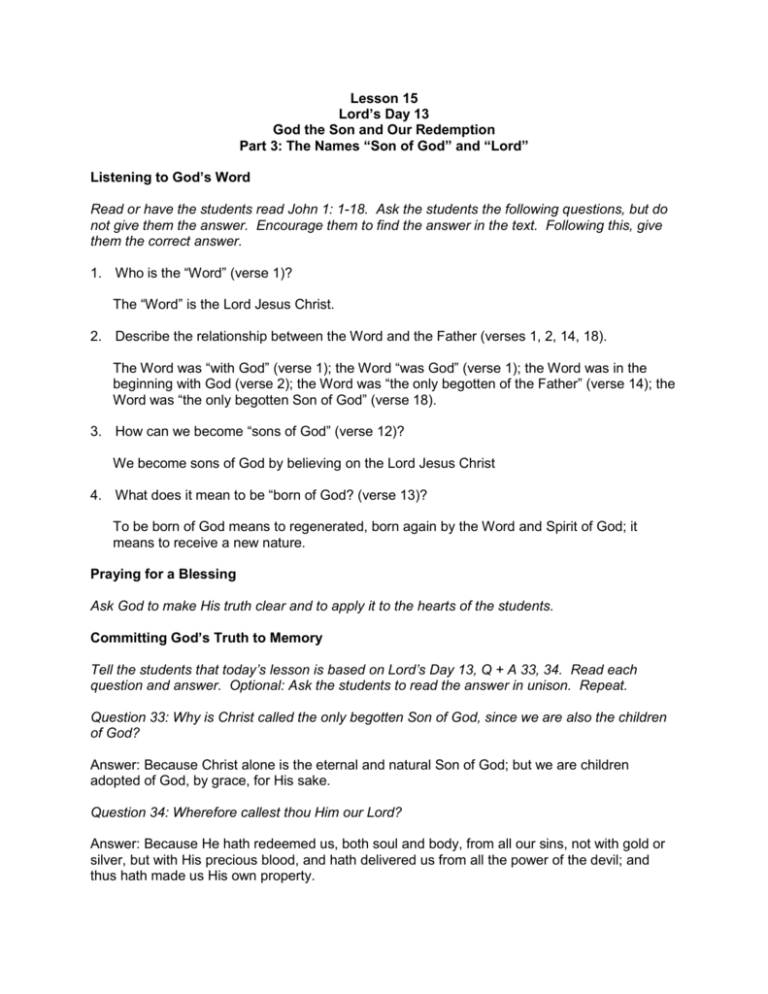
Lesson 15 Lord’s Day 13 God the Son and Our Redemption Part 3: The Names “Son of God” and “Lord” Listening to God’s Word Read or have the students read John 1: 1-18. Ask the students the following questions, but do not give them the answer. Encourage them to find the answer in the text. Following this, give them the correct answer. 1. Who is the “Word” (verse 1)? The “Word” is the Lord Jesus Christ. 2. Describe the relationship between the Word and the Father (verses 1, 2, 14, 18). The Word was “with God” (verse 1); the Word “was God” (verse 1); the Word was in the beginning with God (verse 2); the Word was “the only begotten of the Father” (verse 14); the Word was “the only begotten Son of God” (verse 18). 3. How can we become “sons of God” (verse 12)? We become sons of God by believing on the Lord Jesus Christ 4. What does it mean to be “born of God? (verse 13)? To be born of God means to regenerated, born again by the Word and Spirit of God; it means to receive a new nature. Praying for a Blessing Ask God to make His truth clear and to apply it to the hearts of the students. Committing God’s Truth to Memory Tell the students that today’s lesson is based on Lord’s Day 13, Q + A 33, 34. Read each question and answer. Optional: Ask the students to read the answer in unison. Repeat. Question 33: Why is Christ called the only begotten Son of God, since we are also the children of God? Answer: Because Christ alone is the eternal and natural Son of God; but we are children adopted of God, by grace, for His sake. Question 34: Wherefore callest thou Him our Lord? Answer: Because He hath redeemed us, both soul and body, from all our sins, not with gold or silver, but with His precious blood, and hath delivered us from all the power of the devil; and thus hath made us His own property. Simplified Version 1. Why is Christ called the only begotten Son of God? Because Christ alone is the eternal and natural Son of God. Jn.1: 1; Heb.1: 2. 2. But what about us; are we not--if we believe--children of God too? Yes, but we are children of God by adoption, for Christ's sake. Rom.8: 15-17; Eph.1: 5,6. 3. Why do you call Him our Lord? Because He has made us His property. 4. How has He done this? By redeeming us, both soul and body, from all our sins and by delivering us from all the power of the devil. 5. What was the ransom He paid? Not gold or silver, but His own precious blood. 1 Pet.1: 18,19; I Cor.6: 20. Outline Christ: God’s Son and Our Lord I. II. Christ as Son (Q + A 33) A. Why He is Called Son B. Why Believers are Called Sons Christ as Lord (Q + A 34) Getting Started Ask the students to describe their relationship to a. their parents (they are sons/daughters); b. their teachers (they are students); c. the government (they are citizens; d. the church (they are members) Tell them that Christ also has relationships. First, He has a relationship to His Father: He is His Son (hence He is called “Son”). He also has a relationship to His people: He is our Lord (hence He is called “Lord”) Read the following: So far we have learned that the mediator that we need has two names: the name “Jesus” and the name “Christ”. However, the Apostle’s Creed mentions two more names: “only begotten Son” and “Lord”. Both of these names are explained in Lord’s Day 13. Unlike the previous names, however, these names focus on the person of Christ rather than His work or office. Taking A Closer Look 1. In Article 2 of the Apostle’s Creed we confess that Jesus Christ is “the only begotten Son of God”. a. How do we know that Jesus is the only begotten Son of God? We know this because: Teaching Hint: Have the students look up some of the following verses b. i. The Father Himself says He is His Son (Mat 3: 17; 17: 5; Acts 13: 33) ii. Christ says He is His Son (Joh 10: 36) iii. His followers say that He is His Son (Acts 13: 33; Mat 16: 16, 17; John 1: 34; Mat 27: 54; I John 4: 9) What does the word “begotten” mean? The verb “to beget” means “to give life to”. When a father “begets” a child he gives life to the child. So the Father (in a manner of speaking) gives life to the Son (Psa 2: 4; Joh 1: 14, 18; 3:16). Likewise, the Father and the Son (in a manner of speaking) give life to the Holy Spirit. Sometimes theologians refer to this as the “eternal generation” of the Son. Teaching Hint: As an illustration, ask the students to think of a light bulb and electricity. A light bulb lights up when electricity flows through its filament. So it is with respect to the Father and the Son. From eternity, the Son is generated by the Father. c. What does this imply about the relationship between the Father and the Son? This implies that the Son stands in the closest possible relationship to the Father and yet is distinct from without being subordinate to the Father. Teaching Hint: Remind the students that in LD 8 we observed that the three persons of the trinity are co-eternal, co-equal and co-essential 2. We also confess here that believers are children of God. a. Where does the Bible teach this? Romans 8:14-17 “14 For as many as are led by the Spirit of God, they are the sons of God. 15 For ye have not received the spirit of bondage again to fear; but ye have received the Spirit of adoption, whereby we cry, Abba, Father. 16 The Spirit itself beareth witness with our spirit, that we are the children of God: 17 And if children, then heirs; heirs of God, and joint-heirs with Christ; if so be that we suffer with him, that we may be also glorified together.” Galatians 3:26 “For ye are all the children of God by faith in Christ Jesus.” Galatians 4:4-7 “4 But when the fulness of the time was come, God sent forth his Son, made of a woman, made under the law, 5 To redeem them that were under the law, that we might receive the adoption of sons. 6 And because ye are sons, God hath sent forth the Spirit of his Son into your hearts, crying, Abba, Father. 7 Wherefore thou art no more a servant, but a son; and if a son, then an heir of God through Christ.” b. How, according to Q + A 33 does Christ’s sonship differ from the believer’s sonship? Christ’s sonship differs from the believer’s sonship in that Christ is “the eternal, natural Son of God”; believers are sons of God “by adoption through grace, for Christ’s sake.” Our Catechism mentions two ways in which Christ’s sonship differs from the believer’s sonship. i. What is the first way in which Christ’s sonship differs from the believer’s sonship? Christ’s sonship is “eternal” (meaning it has no beginning and no end; Christ was a Son from all eternity). The believer’s sonship is not. The believer becomes a son in time. ii. What is the second way in which Christ’s sonship differs from the believer’s sonship? Christ’s sonship is “natural” (meaning He is a Son by nature, i.e. by virtue of the fact that He is of the same essence or substance as the Father; He is fully divine). The believer’s sonship is not. The believer is a son by adoption. Teaching Hint: Point out that by nature the believer is an enemy of God. This is why he must be adopted. iii. How can a believer become adopted by God? A believer can become adopted by God only by faith in Jesus Christ. Teaching Hint: Tell the students that when a sinner repents of sin and believes on the Lord Jesus Christ, God adopts him or her to be His child – not because the sinner deserves to be adopted (for he does not), but only by grace. To confirm this, have the students look up and read Joh 1: 12; Rom 8: 14-17; Gal 4: 6; Eph 1: 5, 6. iv. What is the great benefit of being an adopted son or daughter of God? Adopted sons and daughters of God are co-heirs with Christ (Rom 8: 17). Whatever blessings and privileges God bestows on His natural Son He bestows on His adopted sons as well. 3. We confess in this Lord’s Day that Christ is “Lord”. a. What does this name mean? The name “Lord” can have several shades of meaning. In some cases it is simply a form of polite address (like “sir”). In other cases (especially after His resurrection), this name takes on additional meaning. It is used to emphasize the fact that by virtue of His death and resurrection, Christ became the ruler and owner of His people. b. On what basis do we call Christ “our Lord”? (Q + A 34) Christ is our Lord in that “He ransomed us, body and soul, from all our sins…and has freed us from all the power of the devil” (I Cor 6: 20; I Tim 2: 5, 6) i. What does the word “ransom” mean? The word “ransom” means “to purchase someone’s freedom” ii. What does this word imply about our natural condition in Adam? This word implies that we are slaves of sin and Satan. iii. How did Christ “ransom” His people? What price did He pay? (Q + A 34) Christ ransomed His people “not with silver or gold, but with His precious blood” (I Pet 1: 18, 19). In other words, He ransomed them by dying on the cross. When Christ died on the cross, He purchased His people’s freedom. He set them free from sin and Satan. iv. Why did Christ do this? (Q + A 34) He did this so that we might become “His own possession” (Col 1: 13, 14; Heb 2: 14, 15) v. What does this mean, practically, for the believer? It means he is obligated to serve Him all the days of his life. Believers are slaves of Jesus Christ. This must manifest itself in every aspect of their lives. Teaching Hint: Tell the students that before the abolition of slavery in the United States it sometimes happened that a wealthy person who was opposed to slavery would buy a slave for a very high price at an auction market and then set him or her free. Out of thankfulness, the person who was set free would sometimes offer to become the person’s slave. Point out that is also how it is with believers and Christ. When Christ sets His people free, all they want to do is to serve Him out of thankfulness for what He did for them. What About You? Read the following with the students. Ask them to consider these questions openly and honestly before the Lord. Today we learned that Christ is Lord. Who or what is the Lord of your life? Ask yourself: what influences your behaviour, your attitudes, your priorities? You are either a slave of the devil or a slave of Christ. Which is it for you? For Review Ask the students to answer the following questions and hand them in at the beginning of next class: 1. How do we know that Jesus is God? (give four reasons) 2. What does the phrase “Son of God” imply about the relationship between the Father and the Son? 3. How do we know that Jesus is the Son of God (three reasons)? 4. What does the word “begotten” mean? In what way is Christ the only “begotten” Son of the Father? 5. How, according to Q + A 33 does Christ’s sonship differ from the believer’s sonship? 6. What is the great benefit of being an adopted son or daughter of God? 7. What does the name “Lord” mean? 8. On what basis do we call Christ “our Lord”? (Q + A 34) 9. What does it mean practically for the believer to belong to Christ?





